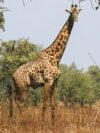Pangolin
Pangolins
Pangolins, also known as “pine cones”, are truly special creatures. They are the only mammals in the world that have bodies armoured with sharp-edged horny scales. But it is precisely their horny scales that are the downfall of these rare ant-eaters time and again. Due to illegal poaching, all species are classified as vulnerable or worse on the IUCN Redlist.
Pangolins – Endangerment status, threats and protection
The pangolin family comprises four species in Asia:
- Indian pangolin Manis crassicaudata (EN)
- Philippine pangolin Manis culionensis (CR)
- Sunda pangolin Manis javanica (CR)
- Chinese pangolin Manis pentadactyla (CR)
and four in sub-Saharan Africa:
- White-bellied pangolin Phataginus tricuspis (EN)
- Black-bellied pangolin Phataginus tetradacytyla (VU)
- Giant pangolin Smutsia gigantea (EN)
- Temminck’s pangolin Smutsia temminckii (VU)
Each of these species is now either classified as Vulnerable (VU) or Endangered (EN) by the IUCN Red List – the Philippine, Sunda and Chinese pangolin are even considered Critically Endangered (CR) (1).
Poaching and illegal trade
The reason for their endangered status is primarily illegal poaching and the trade in the animals’ meat and scales. Pangolins are the most illegally trafficked mammals in the world. According to expert estimates, the annual number of pangolins poached is over 2.7 million animals (2).
Pangolin meat is considered a delicacy, especially in various African but also Asian countries. The scales themselves, as well as the blood of the animals, are often traded as a “miracle cure” in Chinese medicine due to their supposed antiseptic effect. Just like human fingernails, the horn shell consists only of keratin. In some African countries, the scales are also said to have magical powers to protect against evil spirits.
In Africa, all four African pangolins are traded locally. They are used in traditional African medicine as a magic remedy called “muthi” by locals. Some African people believe that a pangolin is the greatest gift one can give to a person of respect (5).
Since the beginning of 2017, pangolins have been given the highest protection status under the Washington Convention on International Trade in Endangered Species of Wild Fauna and Flora (CITES) – commercial, international trade is thus completely prohibited.
The challenge now is to continuously implement stricter controls, and high penalties but also awareness work for poachers and affected communities, to reduce poaching through deterrence. Furthermore, measures against the consumption and distribution of animals must also be taken in Asian countries through educational work and more efficient legislation. The habitats of the animals must be better protected in order to be able to catch poachers.
Habitat loss
However, poaching is only one danger facing the animals. The loss of natural habitat through slash-and-burn agriculture, for example, also aggravates the plight of pangolins.
C4C supports projects and initiatives that have set themselves the task of protecting pangolins.
Sources:
- https://www.iucnredlist.org/en
- https://www.awf.org/blog/27-million-pangolins-are-poached-every-year-scales-and-meat
- https://www.nabu.de/imperia/md/content/nabude/internationalerartenschutz/160922-nabu-factsheet-pangoline.pdf
- https://www.wwf.de/themen-projekte/bedrohte-tier-und-pflanzenarten/schuppentiere-in-not
- https://africanpangolin.org/conserve/species-threats/



